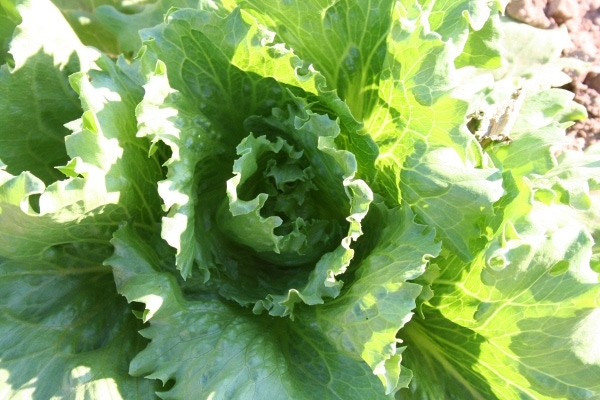
Arizona Veg IPM Update: fall produce insects, powdery mildew on melons, Balan use
Beet armyworms and cabbage loopers - important pests in desert-grown produce during September and October - have been very active in desert crops over the last several weeks.Powdery mildew can occur on fall melons in the desert along with development in the spring and summer.The specialty crops endive and escarole can be treated with the herbicides Kerb and Prefar but not Balan.
October 8, 2012

The latest Arizona Vegetable Integrated Pest Management Update from the University of Arizona (UA) Cooperative Extension in Yuma, Ariz. released Oct. 3, 2012.
Beet armyworm, cabbage loopers in fall produce
By John Palumbo, UA Research Scientist and Extension Specialist
Beet armyworms and cabbage loopers have been very active in desert crops over the last week or so and are historically the most important pests of produce during September and October.
Worm pressure has been light over the last few fall growing seasons, but this year’s population overall appears above normal. Armyworms have been heavy on produce crops for several weeks.
At the Yuma Agricultural Center, beet armyworms currently average more than one larvae per plant in untreated lettuce. Similarly, cabbage loopers are fairly abundant on fall melons this year. Egg lays and small larvae are on all produce crops in fairly large numbers.
Remember, temperatures drive larval development and adult activity, particularly when night time temps remain in the mid-70’s or higher. The higher temperatures over the last week or so are ideal for worm development and moth activity.
As long as the average temperature remains around 85 degrees Fahrenheit, worms should be active at damaging levels.
There are very effective insecticides applied as stand-alone foliar products which provide effective residual control of these Lepidopterous (Lep) species.
Radiant, Proclaim, Intrepid, Avaunt, and the Diamide products (Coragen, Belt, Voliam Xpress, and Vetica) can provide good knockdown and extended residual control of armyworms and loopers.
Research trials show these products provide comparable control on lettuce and cole crops during September and October.
Residual control often depends on the rate applied. In general, the higher the rate then the longer the residual. This also depends on how fast the plant grows and the plant size.
Before selecting a product for Lep control, be conscious of chemistries previously used on the crop. Avoid products with the same mode of action more than twice on any given field.
Check out this link on insecticides available for effective control of beet armyworm and cabbage looper - Lepidopterous Larvae Management in Desert Produce Crops.
Click this link to listen to John.
“Remember, when in doubt - scout.”
Contact Palumbo: (928) 782-3836 or [email protected].
Powdery mildew on melons
By Mike Matheron, UA Extension Plant Pathologist
Powdery mildew can occur on fall melons in the desert. As with powdery mildew development in the spring and summer, the disease first becomes apparent as very small colonies that may be few in number.
However, these spots enlarge and produce ever larger quantities of spores, which in turn initiate more infections which increases powdery mildew coverage of melon leaves.
Compared to powdery mildew in the spring and summer, the rate of disease development may be slower on fall melons due to lower temperatures as plants progress to maturity.
Past fungicide evaluation trials showed several registered fungicides can manage powdery mildew very well, including Microthiol Disperss (wettable sulfur), Quintec (quinoxyfen), Procure (triflumizole), and Rally (myclobutanil).
In a field evaluation trial last spring, three new fungicides in development provided excellent control of powdery mildew, indicating that additional effective compounds for disease management may be available in the future.
The effective management of powdery mildew with fungicides is best achieved by initial application before the first visible presence of the disease.
Good levels of disease control also can be obtained by starting applications after the first visible sign of powdery mildew. Disease management success will decrease as the initial treatment is delayed and the disease becomes more established.
The risk of powdery mildew within a particular melon planting will be determined by the genetic susceptibility of the melon cultivar plus environmental factors during the growing season.
Click this link to listen toMike's Update.
Contact Matheron: (928) 726-6856 or [email protected].
The tolerance of endive and escarole to Balan
By Barry Tickes, UA Area Agriculture Agent
The specialty crops endive and escarole can be treated with the herbicides Kerb and Prefar but not Balan. It has been uncertain if this was the case since these crops have a lower tolerance to Balan or due to other registration issues.
A trial was just completed to evaluate the relative tolerance of lettuce, endive, and escarole to Balan. The trial was conducted in trays under laboratory conditions.
A worst case scenario was created by spraying a 1X (2lb.), 2X(4lb.), and 0 rate of Balan unto the soil with no incorporation. Balan is normally incorporated which mixes and dilutes it and reduces the concentration around the seed.
Silty clay loam soil from the Yuma Valley was used.
At the normal use rate, there was slight injury to endive and escarole. It was worse in the endive. The lettuce was not injured.
It is unlikely that injury would occur in the field at this rate when Balan is incorporated and mixed into the soil.
At the 2x rate, endive and escarole are less tolerance to Balan than lettuce. Endive appears particularly sensitive. The lettuce was not injured.
This injury is from a 2X rate sprayed over the seed with no incorporation which is not likely to occur under normal field conditions.
This demonstrates that endive and escarole are more sensitive to Balan than lettuce. If an excessive rate is applied, not incorporated, or the crop is under stress, injury to these crops is more likely.
Click this link to listen to Barry.
Contact Tickes: (928) 580-9902 or [email protected].
You May Also Like



